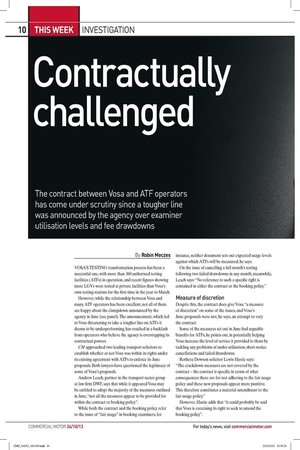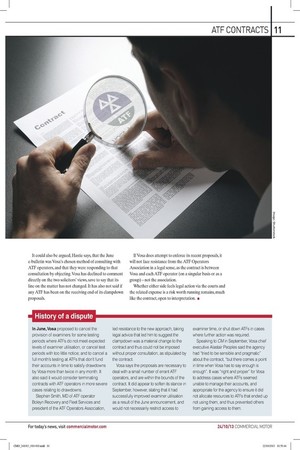Contractually challenged
Page 7

Page 8

If you've noticed an error in this article please click here to report it so we can fix it.
The contract between Vosa and ATF operators has come under scrutiny since a tougher line was announced by the agency over examiner utilisation levels and fee drawdowns By Robin Meczes
VOSA'S TESTING transformation process has been a successful one, with more than 360 authorised testing facilities (ATFs) in operation, and recent figures showing more LGVs were tested at private facilities than Vosa's own testing stations for the first time in the year to March.
However, while the relationship between Vosa and many ATF operators has been excellent, not all of them are happy about the clampdown announced by the agency in June (see panel). The announcement, which led to Vosa threatening to take a tougher line on ATFs it deems to be underperforming, has resulted in a backlash from operators who believe the agency is overstepping its contractual powers.
CM approached two leading transport solicitors to establish whether or not Vosa was within its rights under its existing agreement with ATFs to enforce its June proposals. Both lawyers have questioned the legitimacy of some of Vosa's proposals.
Andrew Leach, partner in the transport sector group at law firm DWF, says that while it appeared Vosa may be entitled to adopt the majority of the measures outlined in June, "not all the measures appear to be provided for within the contract or booking policy". While both the contract and the booking policy refer to the issue of "fair usage" in booking examiners, for
instance, neither document sets out expected usage levels against which ATFs will be measured, he says.
On the issue of cancelling a full month's testing following two failed drawdowns in any month, meanwhile, Leach says: "No reference to such a specific right is contained in either the contract or the booking policy." Measure of discretion
Despite this, the contract does give Vosa "a measure of discretion" on some of the issues, and Vosa's June proposals were not, he says, an attempt to vary the contract.
Some of the measures set out in June had arguable benefits for ATFs, he points out, in potentially helping Vosa increase the level of service it provided to them by tackling any problems of under-utilisation, short-notice cancellations and failed drawdowns.
Rothera Dowson solicitor Lewis Hastie says: "The crackdown measures are not covered by the contract — the contract is specific in terms of what consequences there are for not adhering to the fair usage policy and these new proposals appear more punitive. This therefore constitutes a material amendment to the fair usage policy."
However, Hastie adds that "it could probably be said that Vosa is exercising its right to seek to amend the booking policy".
It could also be argued, Hastie says, that the June e-bulletin was Vosa's chosen method of consulting with ATF operators, and that they were responding to that consultation by objecting. Vosa has declined to comment directly on the two solicitors' views, save to say that its line on the matter has not changed. It has also not said if any ATF has been on the receiving end of its clampdown proposals.
If Vosa does attempt to enforce its recent proposals, it will not face resistance from the ATF Operators Association in a legal sense, as the contract is between Vosa and each ATF operator (on a singular basis or as a group) — not the association. Whether either side feels legal action via the courts and the related expense is a risk worth running remains, much like the contract, open to interpretation. •








































